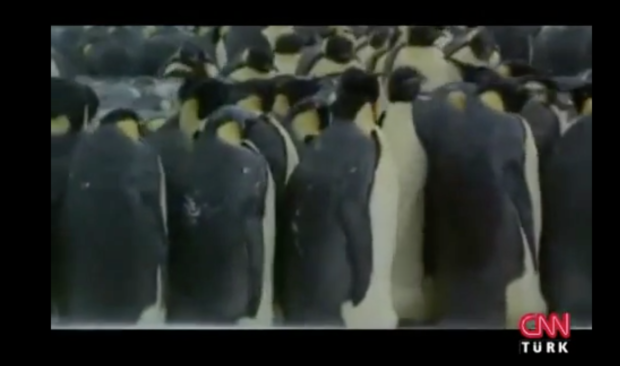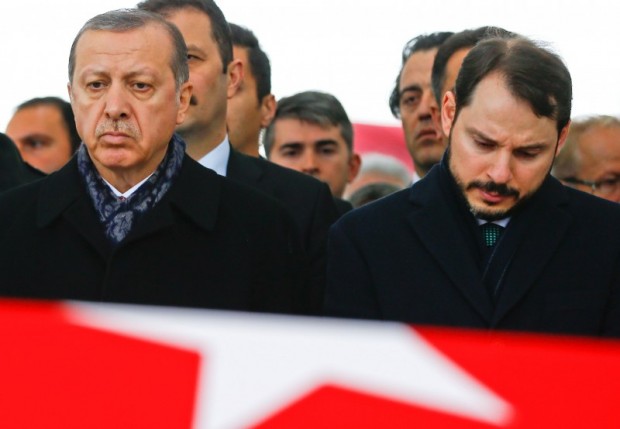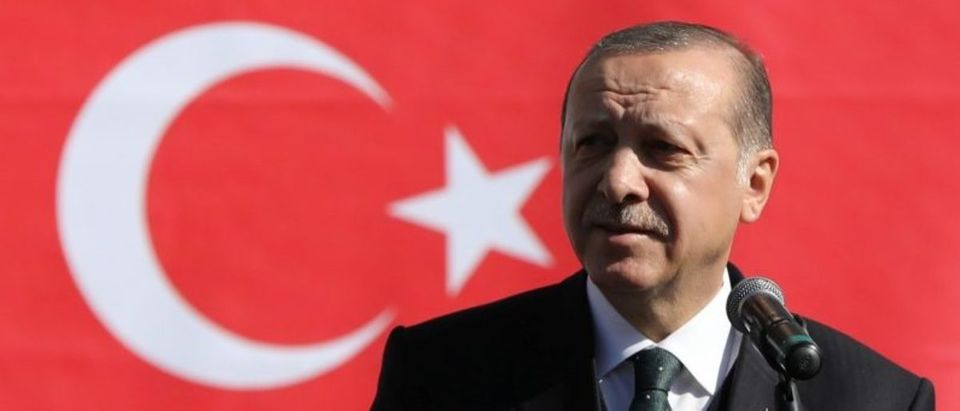To survive as a major news outlet in Turkey these days, TV networks and newspapers must stay on the good side of the NATO nation’s authoritarian president, Recep Tayyip Erdogan, and his ruling Justice & Development Party.
CNN’s Turkish affiliate, CNN Turk, is no exception.
The TV station, which is jointly owned by CNN’s parent company, Turner Broadcasting, and Dogan Media Group, has come under increased criticism in recent months and years for pushing pro-Erdogan and pro-AKP viewpoints, sapping Turkish society of a once-critical media outlet.
CNN Turk’s position is a far cry from its American counterpart, which proclaims itself to be “The Most Trusted Name in News,” a defender of democracy, and an arbiter of journalistic ethics.
But as one journalist targeted by the Erdogan regime put it to The Daily Caller, “with an overtly pro-Erdogan editorial line, CNN Turk is damaging the name and reputation of CNN brand.”
“Its coverage surely feeds into anti-US campaign and helps amplify the hateful and xenophobic narrative uttered by Turkish president Erdogan,” Abdullah Bozkurt, the president of the Stockholm Center for Freedom and former Ankara bureau chief for Today’s Zaman, recently told TheDC.
***
Nothing exemplifies CNN Turk’s allegiance to Turkey’s ruling party as much as penguins.
As tens of thousands of demonstrators hit the streets of Istanbul in late-May 2013 for the Gezi Park protests, the CNN affiliate was airing a documentary about the flightless birds.
More than 8,000 protesters were reportedly injured and at least three people were killed during the protests, which began as a demonstration against the destruction of Gezi Park. The protests and subsequent government response was a watershed moment for Turkish society. The demonstrations revealed Turks’ widespread angst, the government’s heavy-handed response to dissent, and the mainstream media’s willingness to appease the regime by ignoring the turmoil.

CNN Turk aired a penguin documentary during the momentous Gezi Park protests in May 2013. (Youtube screen grab)
The penguin segment earned CNN Turk international scorn and mockery. But Turkey’s democratic institutions, including its freedom of the press, have only been eroded in the four years since the penguins.
The failed July 15, 2016 coup attempt was another turning point for the Middle Eastern state and its media.
More than 250 people were killed when members of the Turkish military launched attacks in Ankara and Istanbul. But Erdogan has used the failed putsch for political purposes and to further undercut Turkey’s democratic institutions. He has issued indefinite states of emergency, pushed through a successful referendum vote that brought the executive branch even more power, jailed hundreds of journalists, and seized the assets of dozens of dissenting news outlets.
Many journalists and government workers have been falsely accused of aiding terrorism based upon the flimsiest evidence that they support Kurdish rebels or Muslim cleric Fethullah Gulen, who Erdogan accuses of masterminding the coup attempt from Pennsylvania, where the imam lives in exile.
***
By most accounts, CNN Turk and Dogan Media did not set out to toe the line drawn by Erdogan. But the network and its parent company have wilted under government pressure to serve as a booster to what is seen as Erdogan’s assault on Turkey’s democratic institutions.
Like other outlets, CNN Turk has been faced with a choice: support the regime or go out of business.
In 2009, the Turkish government slapped Dogan Media with a $2.5 billion fine over unpaid taxes. The levy was seen as retaliation for the media empire’s critical coverage of the regime.
Emails hacked from the account of Berat Albayrak, Turkey’s energy minister and Erdogan’s son-in-law, showed he and Mehmet Ali Yalcindag, the former head of Dogan Media, secretly coordinated news coverage to appease the government.
In the emails, some of which were exchanged last year, Yalcindag briefed Albayrak on the media empire’s coverage, especially as it pertained to Erdogan and his inner circle. He also censored his media outlets’ coverage to ensure it was favorable to the government. Yalcindag referred to one CNN Turk anchor who he viewed as too defiant of the regime as an “enemy.”

Turkish President Tayyip Erdogan, accompanied by Energy Minister Berat Albayrak, in Istanbul, Turkey, December 12, 2016. REUTERS/Osman Orsal
Yalcindag claimed that the emails were fabricated, but he resigned shortly after they were published.
Some critics of the Erdogan regime and kowtowing media recognize the external pressure placed on outlets like CNN Turk.
“CNN Turk has lost a number of critical journalists over the years as a result of intense government pressure,” Aykan Erdemir, a senior fellow at the Foundation for Defense of Democracies, tells TheDC.
“Nevertheless, CNN Turk continues to provide alternative, albeit limited, insights in a media environment that is almost completely dominated by pro-government outlets,” continued Erdemir, who served in the Turkish parliament from 2011 to 2015.
Ilhan Tanir, a Washington-based journalist who writes for Ahval, says that while CNN Turk’s coverage has been “pretty brave” at times in the past, all of the brands under the Dogan Media umbrella have become “pro-Erdogan mouthpieces” and “lost pretty much their critical coverage.”
Bozkurt, who fled Turkey after his outlet, Zaman, was seized last year, is less forgiving of CNN Turk.
“Unfortunately, the CNN’s Turkish affiliate has been rendered to be a laundromat that whitewashes acts of Europe’s dictator [Erdogan] who has jailed 254 journalists,” says Bozkurt.
***
CNN Turk’s pro-government editorial stance is on clear display throughout the typical news day.
Last week, the TV station aired a panel discussion about the case of Reza Zarrab, a Iranian-Turkish gold trader who faces trial next month in the U.S.
Erdogan and his inner circle have pressured both the Trump and Obama administrations to drop charges against Zarrab. The regime and its media enablers have also put forth theories that U.S. prosecutors are acting as secret agents of Gulen, the exiled cleric, to injure Erdogan and his government.
Experts on Turkish politics believe that Erdogan is afraid that Zarrab, who is thought to be cooperating with the U.S. Justice Department, has embarrassing information on him and his family.
In the CNN Turk segment, several panelists spouted conspiracy theories alleged that the U.S. government is using the Zarrab case to blackmail the Turkish government. The panel did not discuss the possibility that Erdogan is legitimately implicated in the case.
The network has also gone along with other pro-government propaganda outfits in its reporting on Henri Barkey, a professor at Lehigh University in Pennsylvania who has criticized Erdogan and the current state of affairs in Turkish politics and society.
Pro-government outlets have accused Barkey of being close to Gulen and of being involved last year’s failed coup attempt. The evidence: that Barkey was at an academic conference 45 minutes away from Istanbul at the time of the coup.
CNN Turk recently asserted, without evidence, that the professor “is thought to be the international leg” of the failed coup attempt.
The network has also been accused of providing an uncontested platform for Erdogan and his party supporters to smear dissenters and opponents.
Like its competitors, CNN Turk typically broadcasts Erdogan’s speeches live in their entirety whenever he speaks. That’s not much different than in the U.S. where CNN and other American networks provide wall-to-wall coverage of Trump’s remarks. But missing from CNN Turk’s coverage is any air-time given to Turkey’s opposition parties, such as HDP, Turkey’s largest pro-Kurd party.
In a letter to CNN Turk last year, Saruhan Oruç, a leader in HDP, accused the network of refusing to provide a platform to AKP leaders’ allegations that the pro-Kurd party is an “enabler” of terrorist groups.
Oruç alleged that CNN Turk refused to allow an HDP spokesman appear on air to respond to the charges.
“There appears to be a secret ban in hosting their spokespeople, deputies and officials,” Bozkurt told TheDC.
While CNN claims to be editorially independent of its Turkish franchise, the network has said little to criticize CNN Turk’s coverage. CNN’s press officials did not respond to multiple requests for comment for this story.
This article initially misstated that Henri Barkey, the Lehigh University professor, appeared at a conference in Iran on the day of the failed coup attempt. The conference was held on an island near Istanbul to discuss regional reaction to the Iran nuclear deal.


